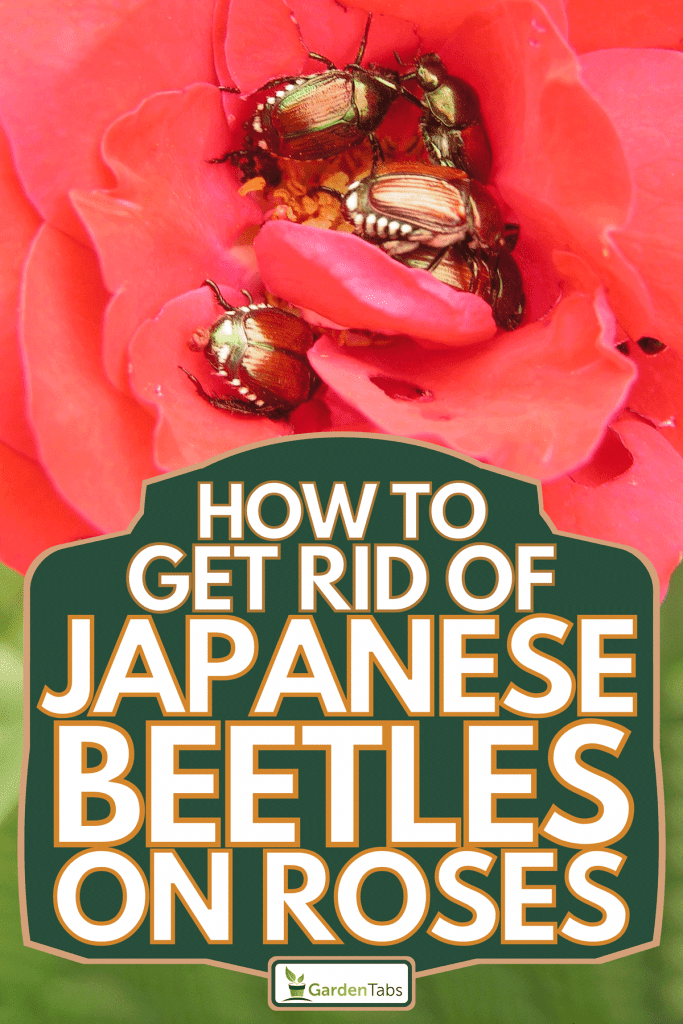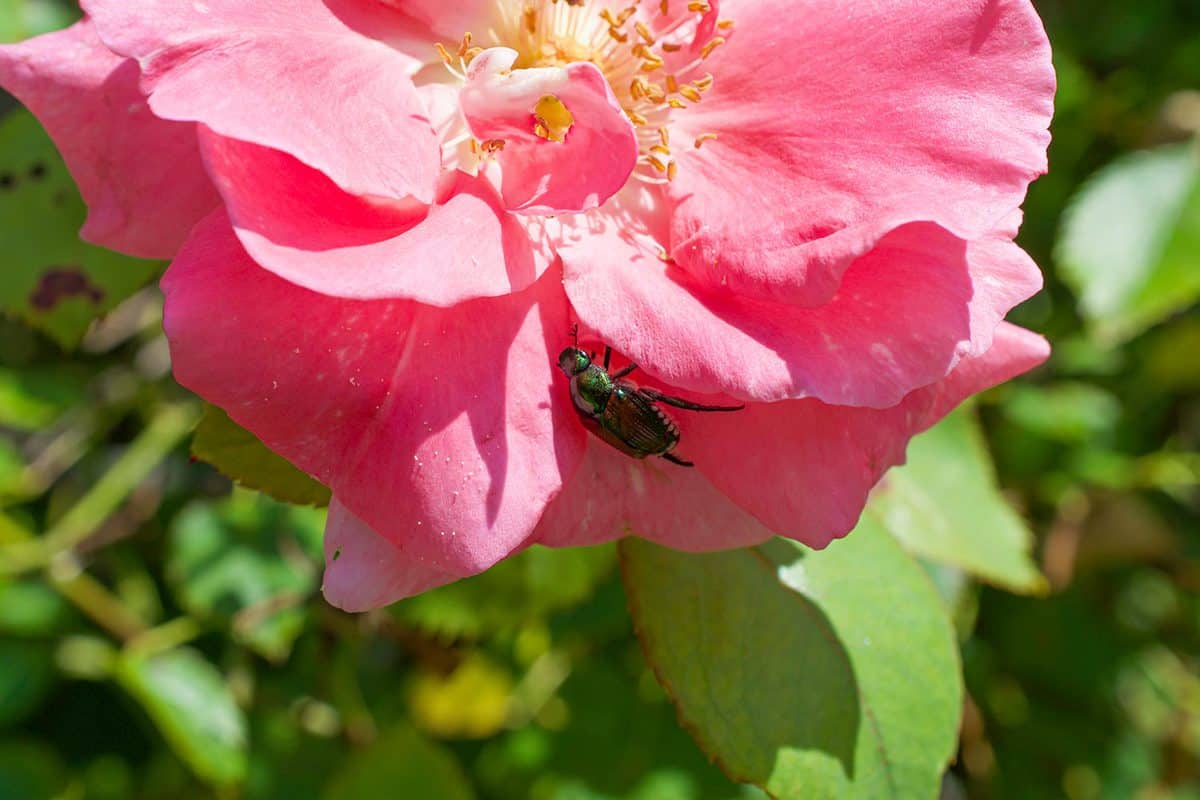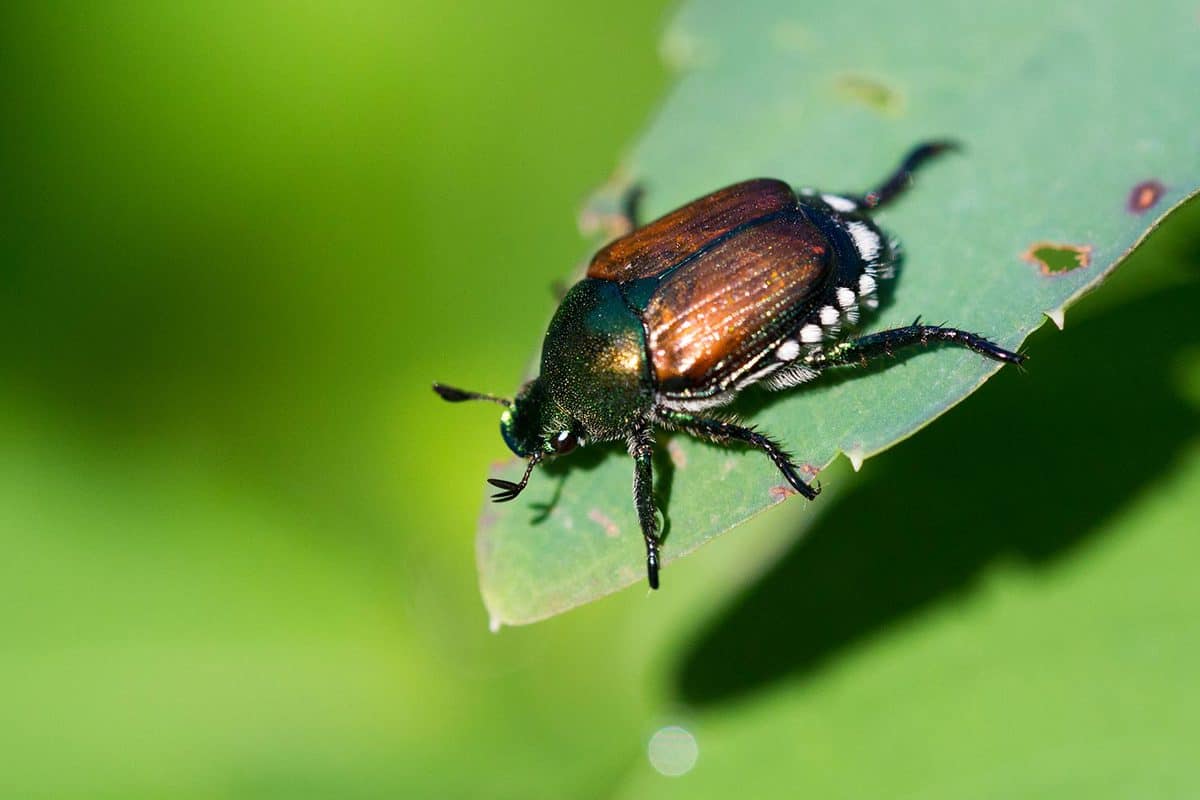There's nothing like the joy of growing healthy, beautiful roses in your garden. However, if Japanese beetles are infesting your flowers, you may wonder if there are any solutions. We researched helpful ways to rid roses of Japanese beetles and deter them in the future.
Japanese beetles are an invasive species that feast upon roses and other plants. Use a mix of natural solutions and commercial pesticides to chase these insects away. Applying multiple strategies best deters these pests and their eggs. Choose from the following ideas to keep Japanese beetles away from your roses.
- Remove the beetles by hand
- Vacuum the insects away
- Use soapy water
- Apply pesticide
- Cover up the plants
When an invasive species doesn't have any natural predators to keep them in check, you'll need to employ solutions that keep them at bay. Continue reading to learn how to stop Japanese beetles from making themselves at home in your garden and destroying your rose plants.

Roses And Invasive Beetles
Roses are not only attractive to people; the Japanese beetle enjoys this flower as a tasty snack and place to lay its eggs. Because the Japanese beetle is an invasive species that was introduced to the US in the early 1900s, it has managed to feast uninhibited on over 300 plants.
Luckily, green thumbs can save their roses from being eaten and utterly destroyed if they use a combination of strategies or methods to eradicate and deter Japanese beetles. Unless properly dealt with, these insects will ravenously consume the leaves and flowers of roses.
Depending on the severity of damage and infestation, you may have to apply a natural or chemical solution to your roses every 7 days. If your rose plant has taken on too much damage, try your best to revive it or start fresh with new plants.
Protect your garden from predators, and don't wait until things get out of control. Use a combination of insecticides, vigilance, covering rose bushes, and growing insect-repelling plants close to roses to stop Japanese beetles from destroying your garden.

Methods To Rid Roses Of Japanese Beetles
Control and reduce the number of Japanese beetles found invading and eating your rose bushes, and keep them away for good. Check out the following solutions.
1. Remove Beetles By Hand
The following solution is not for the squeamish, but if you can stomach it, pluck and remove any visible insects by hand. While you are manually removing beetles from your plants, inspect the leaves, buds, and soil for damage, eggs, and where to apply pesticide.
2. Vacuum Insects Away
If removing beetles manually is too much to bear, pull out a handy vacuum and suck up any beetles found on or around your roses. Work carefully not to harm your plants.
3. Use Soapy Water
If you spritz down your rose bushes with a solution of soapy water, it can force larvae to come up from the soil. Make your roses unattractive for Japanese beetles, and remove any larvae or adult insects that you see after applying the soapy solution.
If you choose this method in the fall or spring, hungry birds may naturally help reduce any visible insects on your plants.
4. Apply Pesticide
It is better to apply pesticide early in the morning while the beetles have yet to awaken and become fully active. Spray down flowers, buds, and leaves with Neem oil, a commercial Pyrethrin-based insecticide, Milky Spore, or another type of insecticide.
Follow manufacturer directions, and apply pesticide regularly until the adults, eggs, and larvae are fully eradicated.
Check out Milky Spore on Amazon.
5. Cover Up The Plants
Before things get out of hand, cover up your roses with a fine mesh netting to make it harder for Japanese beetles and similar insects to get to your plants. Be careful not to trap any grubs or adult beetles under the netting first, and apply insecticides.
Check out this fine mesh netting on Amazon.
How To Identify Japanese Beetles

It's hard to believe that such a beautiful insect can prove so disastrous for your rose plants, but the invasive Japanese beetle is without any predators. These fascinating insects are about half an inch in length, and they have a brilliant green head and thorax and copper wings.
The sides of an adult have five patches of white hairs in an unmistakable pattern. Young larvae are C-shaped, measure between 1/8 of an inch to one inch, and have a cream or slightly white body with a tan head.
Signs Of An Infestation
Japanese beetles love to dine upon the buds, flowers, and foliage of rose bushes, leaving a wake of destruction. You'll soon realize that these insects are the likely culprit when there are giant holes in your leaves, there are barely any leaves left, and buds are thin.
Keep in mind that you will often catch these beetles in the act of chowing down on your roses. Their shiny, metallic bodies will grab your attention, as they contrast against buds, flowers, and leaves. Japanese beetles love to devour buds from the inside out too.
If you see any beetles or signs of damage to your roses, act quickly to save your beloved plants. One of the best defenses is to physically remove as many beetles as you can by hand, with a vacuum, or by knocking them off with a spray bottle. Then, apply multiple treatments.
Can Japanese Beetles Kill A Rose Bush?

Aphids and wasps aren't the only creatures that love to eat rose bushes, as Japanese beetles will go on a feeding frenzy if not removed. It is critical to kill any adult beetles and their larvae, and keep the insects from coming back.
In a short amount of time, Japanese beetles can devour a rose bush until there is nothing left. These insects love dining upon the leaves, buds, flowers, and they do not have any natural predators to control their numbers.
The fragrant odor emanating from roses as well as the scent of chewed foliage attract beetles, and the flowers provide a delicious food source. If left unprotected, Japanese beetles can consume a rose bush until it is ravaged beyond repair.
What To Plant With Roses To Deter Japanese Beetles?
Naturally defend roses and make them less desirable to hungry Japanese beetles by growing them alongside plants they cannot stand. There are more than a few plants that have such a pungent odor that it makes Japanese beetles, aphids, and other pests want to scram.
Try your luck and grow garlic, chives, onions, sage, oregano, mint, parsley, dill, thyme, savory, basil, or hyssop to deter predator insects. Use an arrangement of different plants, and feel free to apply natural or commercial pesticides for an extra measure of protection.
Read more: 25 Fabulous Companion Plants For Roses
Does Peppermint Oil Repel Japanese Beetles?

Keep Japanese beetles from wanting to devour your roses by applying a large dose of peppermint or wintergreen essential oil to your roses. Most bugs, including aphids, whiteflies, ants, and Japanese beetles, cannot stand the smell of mint and other strong scents.
Deter pesky insects from eating up your buds, flowers, and leaves by applying a diluted solution of peppermint or wintergreen essential oil. Other helpful oils that repel unwanted bugs include Wormwood, Juniper Berry, Neem, and Teaberry.
Use about 15 drops of oil for every one cup of water, and use a spray bottle to spritz down your roses. Apply this to your plant regularly until the situation improves. Additionally, spray the fencing and any nearby surrounding plants and decor by any affected rose plants.
Are Any Roses Resistant To Japanese Beetles?
There are no roses specifically bred to resist Japanese beetles. However, you may have better luck growing varieties of climbing roses, or opt for miniature roses that are named "Old Glory," "Picotee," or "Sun Sprinkles." Certain disease-resistant roses may fare better too.
In Closing
We hope that you have gained a deeper understanding of what makes Japanese beetles tick and how to best remove them from your roses. Without administering multiple methods to eradicate and deter these insects, they can mercilessly destroy roses and other plants.
Utilize multiple methods to thwart Japanese beetles and destroy their eggs. Choose natural pesticides and devices to make roses uninhabitable for these insects. Increase your odds of success and apply commercial pesticides to the flowers and leaves of roses too.
Before you leave, don't forget to check out these other posts:
How To Get Rid Of Japanese Beetles [An Exploration Of 8 Methods]


